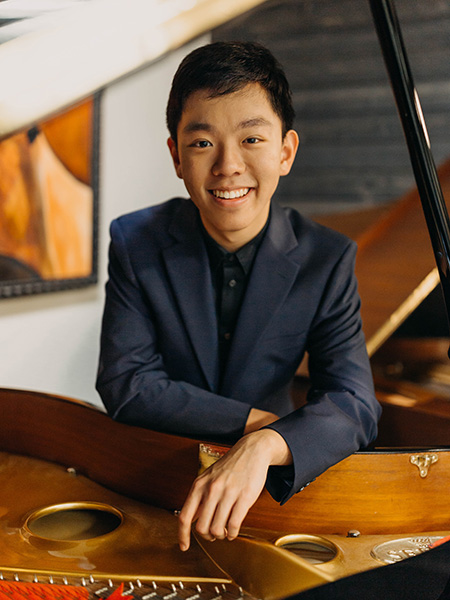When the applause faded, Michael Gu sat down, shook his sleeves from his wrists and nodded to the conductor. Violins rose around him, waiting. After another pause, he began to play.
About 20 minutes later, following an energetic account of Franz Liszt’s Piano Concerto No.1 in E-flat major, he stood up, shook the conductor’s hand and bowed. Applause greeted him once again, this time accompanied by cheers.
It’s a sound that Gu, a first-year Allen School student, has become well acquainted with during his brief time at UW. Gu, who also studies piano performance, won the UW School of Music’s annual concerto competition in February. His rendition of Liszt’s Piano Concerto No. 1, performed with the UW Symphony in April, celebrated that victory. The concert also featured performances from the other concerto competition winners.
Does he ever get nervous out there? For the precocious Gu, who has been playing piano since he was little, performing music has become second nature, a chance to enter “a zone of clarity and focus.” When he lifts his hands over the keys, he said, everything — actions, thoughts, sounds — simply flows. The scenery melts away and there’s just the music left.
These days, he’s focused on finding that same level of comfort when he lifts his hands over a computer keyboard. Liszt, at least right now, comes easier than lines of code.
“Although I’ve had my fair share of terrifyingly difficult experiences with piano,” he said, smiling, “I would have to say that coding is harder.”
But Gu has jumped at opportunities to improve his skills. In 2021, he studied a surface modeling technique at Oregon State University in a graduate computer graphics lab. He then implemented the technique, which maintains a model’s natural movements while minimizing stretching, into a program that creates a hierarchical skeletal system for a 2-D mesh model, eventually presenting his findings to a panel of mentors, graduate students and local professionals.
“This was my first real introduction to the world of computer science,” he said. “It really inspired me to delve deeper into the field and ultimately settle on it as a major.”
At UW, he’s combined his passions and notes that art and science overlap in more ways than one.
“While music and computer science may seem to be different, they’re actually quite similar in that they involve creative ability,” he said. “I find it to be quite an interesting pair, as you have a combination of the classical and the modern.”
He’s used both to broaden his horizons and strengthen the communities around him. Early in his UW career, for instance, he founded DEV[0], a student organization focused on app and software development, and is currently an acting co-chair.
During the pandemic in 2020, Gu saw the impact that music could have on communities in need. He started Musicians for Humanity, a nonprofit dedicated to raising awareness for global humanitarian causes through music and art, helping raise hundreds of dollars to support the World Health Organization’s COVID-19 Relief Fund as well as for high school music programs in his home state of Oregon.
This past year, the organization opened a second branch at another high school in Gu’s hometown. Gu, who also organizes and performs in benefit concerts, said he has plans to expand Musicians for Humanity to other locations along the West Coast and use donations to provide free music instruction to underserved populations. He hopes the organization’s efforts will help make music education more accessible.
“I’ve always been a proponent of the fact that music can heal and bring together groups of people,” he said. “As a musician, I felt that I could use my years of experience to try and make a difference.”
For Gu, making a difference is worth more than a round of applause.
“The ability to have a creative mindset helps us become better coders, artists and people,” he said. “It has been such a great experience to share my passion for music with others and give back to the community that shaped who I am today.”


